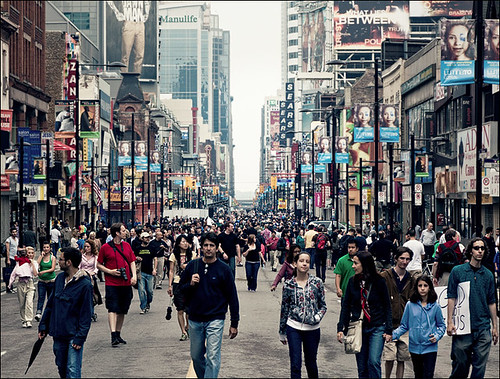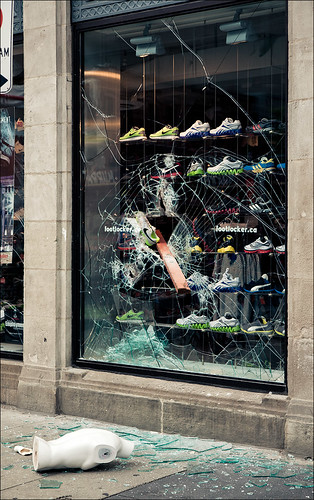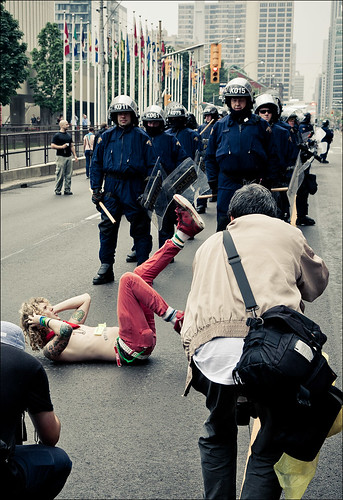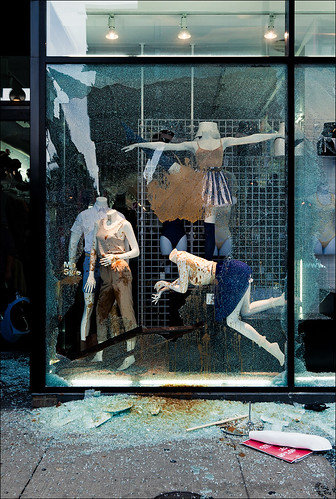G20: Where Have All Our Issues Gone?

NEWS JUNKIE POST
Jul 5, 2010 at 9:13 am
Where have all our issues gone? Long time passing.
Where have all our issues gone? Long time ago …
So the Toronto G20 meetings have come and gone, but they remain in the news and the public eye because of the protests. Thanks to citizen action more protests are following up on the G20, and the public has taken notice. Just one problem … outside of the progressive media, can anyone find any mention of what our issues actually were? Things like gender equity, poverty, the Tar Sands … any of it? Is that what people are talking about?
Of course not. What they are talking about is the vandalism and violence. Who is going to listen to demands for justice when there are burning police cars to watch? And the follow up protests? They’re about the violence too. All of the reasons that we were there in the first place? not merely never heard, but now displaced as energy goes into organizing the follow up demonstrations.
Of course there was police violence too, but lets talk about the handful of people who dress in black and use protests as an opportunity to act like frat boys on spring break. It is their actions that are displacing our issues from the public dialogue and which generate the follow up actions and activities. Naturally the police violence should be dealt with, but it seems more than enough people are talking about that.
 Why are we not collectively talking about the fact that once again our issues have been completely co-opted? That fact, more than anything, should be our biggest concern, no?
Why are we not collectively talking about the fact that once again our issues have been completely co-opted? That fact, more than anything, should be our biggest concern, no?
Of course to the extent that the police and authorities over-reacted and committed criminal acts we need to respond to that and take appropriate action; that is a given.
But have we forgotten what we were protesting for in the first place? And are we not concerned that our message got totally lost (again)? Have we no interest in how, or why?
The violence vs non-violence debate is as old as protest. It was debated over and struggled with by the suffragettes, labour, civil rights, feminists, etc and has many facets to it. For our purposes here lets set aside the moral & other considerations and be purely pragmatic about it. What is it meant to accomplish? And does it accomplish that?
Right away there is a difficulty in that the goals of those committing the acts of violence are not necessarily the same as those who organize the protests. For the moment lets assume that they are. Let’s accept at face value that “The Anarchy group believes that violence is sometimes necessary if our voices are to be heard.”
If that is really their purpose, then the tactic is a complete failure. Not only does it not get our voices heard, it drowns them out and diverts energy and resources away from the issues.
That the media will pay attention and highlight any violence no matter how marginal or unrepresentative is as surprising as the fact that water is wet. We know that perfectly well, so let’s stop blaming the media for it when, we also knew that to prevent being co-opted we had to prevent the violence. We knew it and we didn’t do it, so let’s own that.
The violent actions do considerable damage to our causes by alienating many of the people we are trying to bring onside. This includes many who are part of the progressive movement such as unions and many faith groups. No matter what we may say to the contrary, the general public perceives the vandals and peaceful protestors as one group, and there is some justification for that perspective.
 In so much as we could prevent the violence and do not, we accept the vandals as being part of us. Are we not the ones who harp on “silence is consent”? How then is the public to understand our silence with regard to those acts and these people? By our silence we condone them, so lets be mature enough to own responsibility for that too.
In so much as we could prevent the violence and do not, we accept the vandals as being part of us. Are we not the ones who harp on “silence is consent”? How then is the public to understand our silence with regard to those acts and these people? By our silence we condone them, so lets be mature enough to own responsibility for that too.
Are they really “one of ours”? Is anyone who espouses the same values automatically “one of us” regardless of what they do? What are the limits if any? If they injure police? Media? Passers by? Other activists? Where do we draw the line?
What are their values really? As far as I can tell their operating principle is that acts of violence to achieve your ends are fine, if you have the means to commit them and can get away with it. Is that really what we are collectively about? And if so, how are we different from those currently in power other than that we are not in power?
How do we feel when we see the same sorts of acts being committed by sports fans? Or people fighting for causes that are the opposite of ours? When a group trashes an abortion clinic or some ethnic cultural centre do we shrug and say “it’s a legitimate form of protest”? And if they are really “one of us” why is it always us who have to be in solidarity with them? Why can’t they be in solidarity with us? And so on.
In so much as they undermine our efforts and are indifferent to our goals, I submit that they  are not “of us.” They are what Moyers describes as the ineffective rebel; angry, disempowered and self-absorbed they do what they do more to be the centre of attention than for any other reason.
are not “of us.” They are what Moyers describes as the ineffective rebel; angry, disempowered and self-absorbed they do what they do more to be the centre of attention than for any other reason.
Their methods in engaging the rest of the movement is a case study in “The Tyranny of Structurelessness.” They have confused “having an effect” with “being effective”and consequently do whatever is flashiest without regard to whether it achieves anything or not.
Make no mistake, we could keep them away and prevent the vandalism and violence if we chose to. The crowd at the N17 IMF protests found that simply booing the Bloc was enough to make them stop. In the 1960s they developed many techniques for effectively preventing violence at protests. We could stop them, but we don’t.
Which brings up perhaps the most difficult issue of all, the strange contradictions that the existence of the vandalism underscores. We march in our tens of thousands chanting “people power”, yet claim to be powerless to stop the vandalism. We claim to have answers for issues as complex as the Middle East and climate change, yet can’t manage a few dozen disruptive young people in our own midst. We claim our issues are of utmost importance, but apparently not so important that we are willing to confront the disruptive elements among us when they undermine our efforts.
Our issues are critically important. So much so that we owe it to them to do what we must to  ensure the success of our actions. Poverty, gender inequity, the environment, racism … all of them suffer as we indulge ourselves by not confronting the problems within the movement openly and honestly.
ensure the success of our actions. Poverty, gender inequity, the environment, racism … all of them suffer as we indulge ourselves by not confronting the problems within the movement openly and honestly.
Being empowered means we don’t blame the media, or the police, or the Bloc, or the public, but rather we accept the responsibility ourselves and we act. In the 9 years since the 2001 Summit of Americas protests Harry Potter has managed to grow up, isn’t it past time that we did so as well?
Where have all our issues gone? Co-opted by the Bloc, every one.
When will we ever learn? When will we ever learn?
Image Credits:
G20 Scenes by wvs
Broken G20 by wvs
G20 Scenes by wvs
G20 Scenes by wvs
G20 Scenes by wvs
Related Articles
- November 14, 2012 Can Europe Spark a Global Revolution Against Shock Capitalism?
- July 26, 2010 Diversity Of Tactics: The Noise Before Defeat
- July 7, 2017 Welcome to Hell for Capitalists Who Wreck and Exploit
- October 11, 2013 Global Police State Calls for Globalization of Dissent and Protest
- November 14, 2012 Spain’s Sado-Monetarism: Will it Lead to Revolution? – Part I
- April 18, 2011 Love, Blood and Rhetoric












4 Responses to G20: Where Have All Our Issues Gone?
You must be logged in to post a comment Login